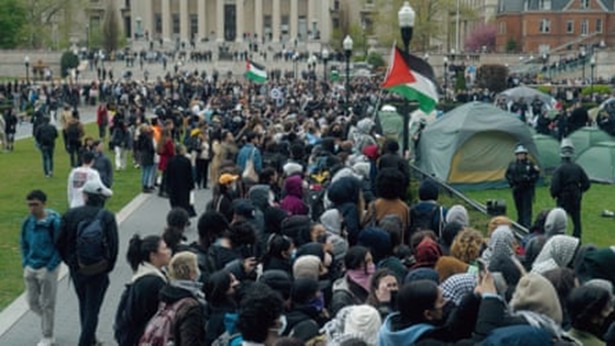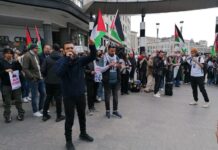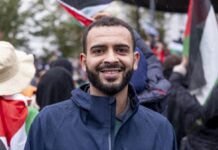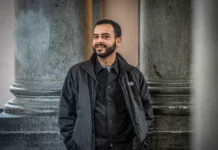
By Benay Blend
Early on the morning of April 17, 2024, hundreds of students set up camps on the main squad of Columbia University in New York City.
Their demands included disclosure and divestment from companies profiting from the Israeli occupation of Palestine.
A recent film, The Encampments, jointly produced by Watermelon pictures and Breakthrough News, documents the rekindling of pro-Palestinian activism across college campuses in recent years.
Inspired by the anti-Vietnam war protests of the late 1960s, the students called their encampment “The Liberated Zone.”
They could have looked back farther to view the sit-ins at Ford Motor plants in the 1930s.
Because elite universities are incubators of American leadership, the Columbia administration quickly threatened to shut down the student action. Two days later police in riot gear entered the campus with the blessings of the administration.
Throught 2024, encampments spread to over 100 universities, thus raising awareness of US support of Israel’s genocide of Gaza.
As pictures of demolished structures and dismembered babies flooded social media, protestors escalated their demands to encourage their administrations to cut all ties with Israel.
When officials countered that this procedure was too complicated for people to understand, students reminded their administrators that there were precedents. Under pressure, universities had divested from South Africa as well as from fossil fuel companies, so what makes divestment from Israel so different?
Directors Kei Pritsker and Michael T Workman cover several months of life in the encampments, showcasing in particular the principled motivations of the students which countered misguided “extremist,” “antisemitic,” and “extremist” characterizations by members of Congress, campus administrators, mainstream media and Zionists within the general public.
It was perhaps unfortunate that the directors spent so much time countering these charges. Not only does it allow Zionists to control the script, but it paints a picture of “good activists”/ “bad/activists”; non-violent protest/armed resistance; and “good Palestinians”/ “bad Palestinians.”
In all, it reinforces the view of Palestinians as “perfect victims,” a role that Mohammed El-Kurd traces in Perfect Victims: The Politics of Appeal (2025). Such depictions override the right of Palestinians to be viewed as people with dignity who are fighting for the liberation of their land.
Juxtaposing clips of Israelis claiming that Palestinians do not care about their homes, their dead, or really anything that would make them human with scenes of Gaza’s destruction Illustrates the unrealistic ways that Zionists justify the genocide of Palestinians. Like the 1974 documentary “Hearts and Minds,” which used the same techniques to denounce official U.S. propaganda during the war in Vietnam, no words are needed to show the lengths that imperialists will go to in order to justify their aims.
“The scenes of Gaza’s destruction add a certain urgency and elucidate the students’ demands as neither whimsical nor abominable,” Azad Essa claims. Nevertheless, he qualifies that the film ignores the Palestinian resistance in Gaza, an issue that turned Palestinian solidarity into a criminal offense on college campuses around the world.
Emphasizing that the activists chose non-violent resistance creates the “danger of dividing pro-Palestinian advocates into ‘good’ and bad’ protestors based on this appeal to the liberal gaze,” Essa claims, reiterating the assertions that El-Kurd made in his book.
In the end, this appeal fell on deaf ears, as the government proceeded to punish selected students based solely on their words.
Nevertheless, as the directors show, these accusations are not only groundless but have far-reaching effects. Under the influence of Zionist donors and various right-wing groups, the charges have led to the stripping of foreign student visas and the disappearances of green card holders, including Mahmoud Khalil, who remains detained in a Louisiana prison.
As Essa notes, the film exposes “how the accusation of antisemitism, long weaponised by supporters of Israel, became the state-approved cudgel to beat down on those opposing US foreign policy and university investments.” That these claims came from a community of pro-Israel students and faculty who were fully backed by the administration, the police force, and several layers of government, the film also discloses “the willfully dishonest paranoid delusions of the Zionist project itself.”
Like the sit-ins led by auto workers in the ‘30s, who held classes in labor history, these encampments provided a cultural/scholarly component, where students studied how to dance the dabke as well as learned about de-colonial movements of the present and the past.
Echoing the Occupy movement several years ago, the students created the kind of community in which they would like to live, a place where there would be time for relaxation as well as learning, where there was food sharing that would ensure no-one would go hungry, and where differences would be honored along with commonalities.
Facing powers greater than themselves, the movement would be visibly over by the start of summer. But, as the late writer/revolutionary Ghassan Kanafani said, it’s possible to murder individuals but impossible to kill ideas.
“A lot of the students are not going to stop,” director Kei Pritsker concluded. “I don’t think anyone involved in the Palestinian movement signed up for the movement because they thought it would make them more safe or comfortable. I think most of us understood that it would make us less safe. It might actually pose risks to our safety, but none of that matters because if none of us are safe – if someone out there is under the threat of being bombed or being shot at any moment on any given day – then we’re all unsafe.”
Discover more from Samidoun: Palestinian Prisoner Solidarity Network
Subscribe to get the latest posts sent to your email.




